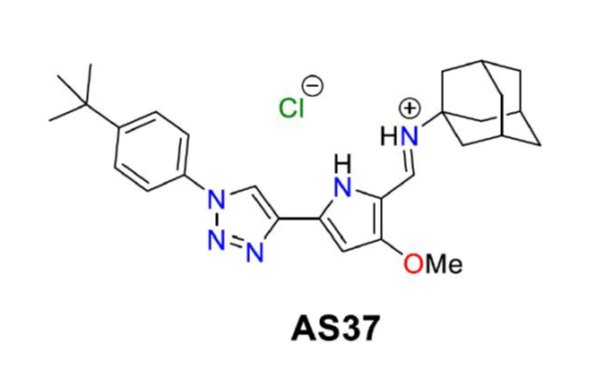
Highly useful lactate carrier molecules in cancer treatment
Advantages
The main advantages of this technology are as follows:
- It is the first family of molecules capable of facilitating the transport of lactate across biological membranes.
- These molecules transport lactate independently of the cell’s own transport mechanisms, such as monocarboxylate transporters (MCTs).
- The molecule AS37 is capable of altering intracellular and extracellular lactate concentrations in the presence of an MCT inhibitor.
- The ability of this compound to act synergistically with widely used chemotherapy agents such as cisplatin has been demonstrated in in vitro experiments with tumor cells.
Goal
Trade Agreement, License Agreement, Technical cooperation: further development, Technical Cooperation: testing of new applications; Technical Cooperation: adaptation to specific needs.
Intellectual Property
Patent application nr. P202330370
Priority date: May 11th 2023
Reference
Reference in UBU: 166
Reference in UB: UBTT0477-E
Contact
University of Burgos:
Marta Sendino
Email: mfsendino@ubu.es
Tel: +34 947 49 20 36
University of Barcelona:
Inma Íñiguez
Email: iiniguez@fbg.ub.edu
Tel: +34 934 039 970
Highly useful lactate carrier molecules in cancer treatment
Executive summary
A group of researchers from the University of Burgos, in collaboration with IDIBELL and the University of Barcelona, has patented a family of molecules that have the ability to transport lactate in living cells. The ability of these molecules to alter the lactate concentration in cells can have a significant impact on cancer therapy, as it has been observed that high levels of lactate in the tumor microenvironment are associated with progression and treatment resistance in some cancer cases.
This technology represents a new advancement in the search for therapeutic strategies against cancer.
Description
This pioneering research carried out by a group of scientists from the University of Burgos in collaboration with IDIBELL and the University de Barcelona has achieved an innovative discovery by identifying and developing the first molecules capable of effectively transporting lactate across biological membranes. As an example, one of the synthesized molecules (AS37) is capable of interacting with lactate, forming a complex that, unlike lactate, can traverse the cell membrane. This allows for the alteration of lactate concentrations in cells, with lactate playing a relevant role in the characteristic metabolism of cancer cells. In vitro studies have shown that these compounds can make cancer cells more sensitive to other drugs used in chemotherapy, presenting potential applications in this field.
The described molecules are capable of interacting through hydrogen bonding with lactate anions, forming a supramolecular complex that can diffuse through lipid membranes. In this way, it is possible to facilitate the passage of lactate across cell membranes independently of the cellular mechanisms responsible for this process, known as monocarboxylate transporters (MCTs), which are transmembrane proteins. This mechanism can be demonstrated by using an inhibitor of this type of MCT protein, such as syrosingopine. In the presence of syrosingopine, the molecules are capable of altering the intracellular and extracellular lactate concentration in cancer cells according to the obtained in vitro results. It has been demonstrated in this in vitro model that this strategy sensitizes tumor cells to chemotherapy agents such as cisplatin. This synergistic activity opens the door to exploring the utility of these molecules in the development of new therapies for cancer treatment.
The described compound allows for the alteration of lactate permeability and homeostasis in vitro. As lactate is a therapeutic target in cancer treatment, the possibility of developing compounds with therapeutic application for the treatment of this disease arises. The mentioned compounds can serve as tools for biochemical and cellular biology research in this context, either alone or in combination with MCT inhibitors.
Current stage of development
In vitro tests.

